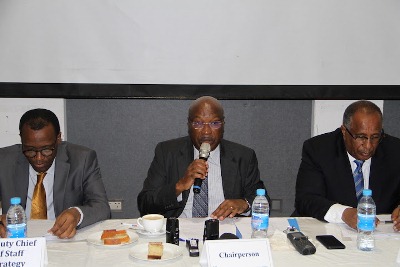slow screening process delays training of South Sudan’s unified forces
January 25, 2020 (JUBA) – The head of the Reconstituted Joint Monitoring and Evaluation Commission (RJMEC) urged to start the screening process which is essential for the selection of troops before military training.

Speaking at the RJMEC meeting in Juba on Thursday 23 January, its chairman. Augostino Njoroge voiced concern about the delayed screening and subsequent training of forces in South Sudan.
“I am concerned that the screening of forces has not started yet, even though the screening teams are reported to be ready to begin,” Njoroge said.
He pointed out that no training can take place before the screening, and “the more it is delayed, the more the time that will be lost in beginning the training of the Necessary Unified Forces (NUF)”.
The Kenyan military urged the Joint Defence Board (JDB) to ensure that the screening, selection and training of forces “starts immediately in consultation with the Disarmament, Demobilisation and Reintegration Commission.”
The slow pace of the implementation of the security arrangements triggered the extension of the pre-transitional period twice for six months first and 100 days for the second time.
The lack of money of the costly process and the lack of political will to strike a deal on the number of states and tribal boundaries, all these factors did not contribute to building confidence among the main peace partners.
Njoroge further pointed out that the Security Mechanisms, set for the enforcement of the second chapter of the revitalized pact, have fallen behind the timelines of their action plans.
“Ambassador Njoroge asked the mechanisms to coordinate their activities more closely,” said the statement.
He added that the NPTC which oversees the implementation of the pre-transitional period and the Joint Defence Board (JDB) to immediately convene the weekly coordination meetings of the mechanisms and to fast-track the implementation of the critical tasks in the remaining 30 days.
Despite the delay in the implementation of the security arrangements and their failure to reach a deal over the states’ issue the parties to the revitalized peace agreement agreed to form the transitional unity government in February.
(ST)
